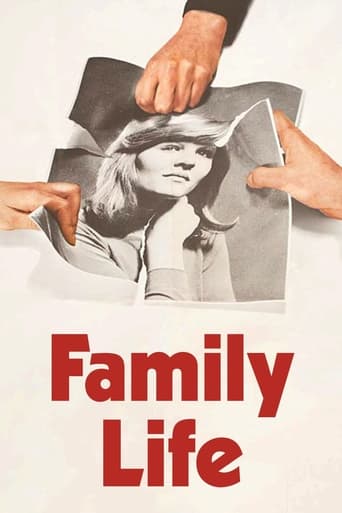Sindre Kaspersen
British social realist director Ken Loach's third feature film, an adaptation of the television play "In Two Minds" (1967) which was written by David Mercer (1928-1980) and directed by Ken Loach, was shot on location in Britain, and tells the story about 19-year-old Janice who has been brought up in a very strict working-class family. She lives with her mother and father who thinks she is irresponsible because she often changes jobs. Janice doesn't do what her parents want her to do and she stands up to them, so they decide that she is sick, talks her into having an abortion because they don't think she is fit to be a mother, sends her to a psychiatrist and eventually to a mental health institution.Acutely directed and with a straightforward narrative, this quietly paced and dialog-driven British independent film about social alienation and family relations touches the theme of Schizophrenia, and portrays a quiet study of character with a pointedly understated performance by Sandy Ratcliffe in her debut feature film role as a young woman who's way towards independence and self respect is obstructed by her parents, who are more interested in giving her directions and criticism rather than giving her the encouragement she needs her to live her own life. This compassionate, realistic and social documentary drama from the early 1970s, captures the failure in communication, the generational differences and the involuntary surrender of a 19-year-old woman who is being oppressed by her caretakers.Ken Loach has a take on depicting stories about individuals who are misconceived and wrongfully treated by society, and his gentle and attentive approach is commendable. As his second feature film "Kes" (1969), "Family Life" has heart, substance and relevance, and is a fine introduction to the works of one of Britain's greatest directors.
justintlott
I first saw this film a few years back in a graduate school film class and it continues to haunt me with its power. During the initial screening, I actually had to leave the class for some air and collect myself: it struck a nerve that I hadn't felt sense my teenage years: the frustration of being a troubled teenager who was sorely misunderstood. . Most parents like to think of themselves as good parents if they work and put food on the table (which is hard enough in itself.) But that is not enough! Nurturing comes to play as much as being a provider and this is something the parents just don't get. And what's sadder is that they are in a highly polarized environment (1971) between young and old, both sides too quick to assign blame. As a teenager growing up in the 90s, I experienced some of the same frustrations as the girl in this story and was all too often categorized as a "problem" simply because the adults in my life were "doing the best they could" and therefore there has to be something wrong with me. I was luckier than the girl of this story, who's best hope for salvation is vanquished by a psychiatric bureaucracy that is too concerned about appearances to have the patience to be progressive in their ways and their thinking."Family Life" is a rarity. A film that does not get old but can serve as a lesson and a warning to future generations.
Al
Filmed in a distant documentary style presumably for realism. The film may have provided a touch of inspiration for later films such as Frances starring Jessica Lange.Sandy Ratcliff plays a disturbed young woman who fails to be understood by the authority figures represented in many ways by her surprised parents and also by the medical/psychiatric staff.The bleak conversational way in which it is filmed adds to our feeling of helplessness for Ratcliff's character which at times is as mischievous and out of control as Jessica Lange later was in her portrayal of the late Frances Farmer.
frrahier
Family Life I've seen this movie at the end of the seventies, in France, on TV. I registered it, but I lost the tape. Since, I remember a great film, the first of Ken Loach I think. Always in my memory is the last scene, Janice alone behind the students in the amphitheater's and doctor saying that the problem is in his mind and no in the relationship with her parents. I read in some reviews of this time that Ken Loach based his story on the "antipsychiatrics theories" of Dr. Ronald Laing and Cooper, that I studied in France when I was scholar, theories developed in the neighborhood of Jean Paul Sartre's existential psychoanalysis. Recently, a friend of mine, teacher of English literature in my college, initiate a curse on these problems with her students. She needs the original script of this film, but we don't know other that the French translation issued in the L'Avant-Scène french review.. Who could send me part of the script of this film (in English)? Thanks.



